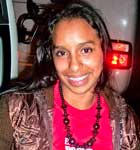Chávez releases gov’t funds for workers, not bankers
By
John Catalinotto
Caracas, Venezuela
Published Oct 30, 2008 10:51 PM
While the Bush gang in Washington and its counterparts in London, Paris,
Berlin, Madrid and Tokyo were turning over the public treasury to financiers,
Venezuelan President Hugo Chávez was releasing government funds to a bank
designated to make loans to popular projects in that country’s poorer
communities.
On Oct. 17 Chávez inaugurated the program, which will help establish
cooperative businesses and small construction projects connected with services
for the people, before an audience of about 250 red-shirted supporters in a
theater in downtown Caracas. In the crowd were 25 of the nearly 200 writers,
economists, activists and organizers participating in the VIII meeting of the
Network of Intellectuals in Defense of Humanity held jointly with the Forum of
Alternatives.
The internationalists got cheers and applause as the president introduced them
one by one. Colombian human rights activist, Senator Piedad Córdoba,
received a standing ovation.
The meeting showed some of the strong points of Venezuela’s Bolivarian
Revolution: strong popular enthusiasm, topped by affection and admiration for
Chávez himself. The president’s talk, rather than a lengthy
monologue one might expect, was a give-and-take with the people, one with which
both Chávez and the crowd seemed completely comfortable.
Even the youngest of the local organizers he questioned, a 24-year-old woman
named Miledis Pineda, had a grip on every detail of the project she was responsible
for in her community. Then to top off the dialog, Miledis demanded to come to
the stage to give Chávez a hug. It was the president’s only moment
of hesitation—but Miledis ran down the aisle, leapt onto the stage and
stole the show.
|
Miledis Pineda
WW photo: John Catalinotto
|
While Miledis’ intervention was the most dramatic, all those who were
questioned by Chávez knew their business and had no fear of tripping up in
public, or at least none that could be seen. Most of those responsible were
women, reflecting another point of great progress for this revolution.
One conversation took place over closed-circuit television with a
food-processing cooperative. The overall impression was of a population that
had confidence in Chávez and in themselves.
While this meeting showed dramatically some of the progress made in Venezuela
over the past 10 years, there are undoubtedly many challenges facing the
revolution. The vast oil wealth has been nationalized, as was the steel
industry and mining, but foreign imports and the media—TV, radio and
newspaper—are still mostly in the hands of Venezuela’s wealthy
class. These media are completely and often viciously anti-Chávez and
anti-revolution.
Illiteracy is all but eliminated, and children of the poor now make up a
majority of those in university, mostly in state-run schools, with thousands of
new doctors being educated in Cuba. The “missiones” that bring
subsidized food and medical care to and organize leisure activity in the
communities are impressive. But like the one in metropolitan Caracas called
Gramoven, they still only reach a minority of Venezuela’s vast poor
population. Some 80 percent of food is imported, which has presented no
immediate problem because Venezuela’s great oil wealth provides a trade
surplus shared among the population.
The Bolivarian Revolution, as most here will tell you, is still a work in
progress that must defend itself against powerful enemies, especially in
Washington, who threaten with economic sanctions and the renovated Fourth
Fleet. It is a revolution that international solidarity can help to
succeed.
Catalinotto was one of two people from the U.S. at the VIII international
meeting.
Articles copyright 1995-2012 Workers World.
Verbatim copying and distribution of this entire article is permitted in any medium without royalty provided this notice is preserved.
Workers World, 55 W. 17 St., NY, NY 10011
Email:
[email protected]
Subscribe
[email protected]
Support independent news
DONATE


